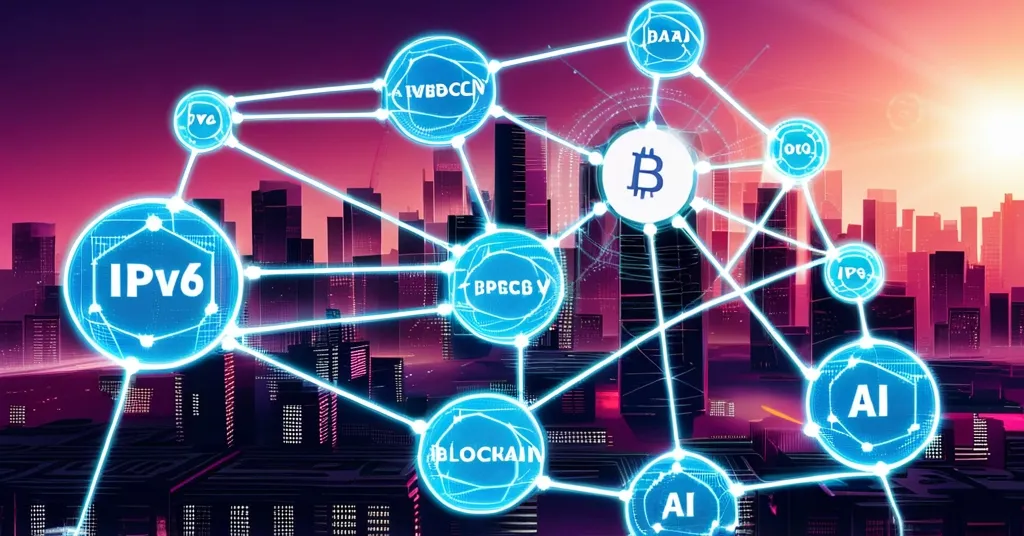WIC Wuhan Summit: IPv6 and Blockchain Boost AI’s Future

WIC Wuhan Summit: IPv6 & Blockchain to Enhance AI Explosion
The WIC Wuhan Summit, held in China from November 19-22, emphasized the integration of IPv6 and blockchain as vital for the rapid advancement of artificial intelligence (AI). Keynote speaker Latif Ladid highlighted these technologies’ role in mitigating AI risks like security vulnerabilities, privacy issues, and job displacement, while boosting data integrity, privacy, and transparency. The summit showcased a vision where AI, supported by robust technologies such as IPv6 and blockchain, would drive innovation across various sectors, including healthcare and supply chain management.
- WIC Wuhan Summit focused on AI’s future with IPv6 and blockchain.
- Latif Ladid discussed the risks and benefits of AI, emphasizing the role of IPv6 and blockchain.
- AI risks include security vulnerabilities, privacy issues, and job losses.
- IPv6 enhances AI through secure connectivity; blockchain ensures data integrity and privacy.
- Upcoming events in China will continue to explore these technologies.
The WIC Wuhan Summit, drawing 20,000 attendees, unveiled the thrilling intersection of AI’s boundless potential with the robust frameworks of IPv6 and blockchain. The summit’s mission was clear: to embrace a digital future guided by AI-for-good principles, showcasing how these technologies can forge a shared future in cyberspace.
Latif Ladid, the esteemed President of the IPv6 Forum, delivered a keynote address that delved into the symbiotic relationship between IPv6, blockchain, and AI. He addressed looming AI risks, from security breaches and privacy erosion to job automation’s societal impacts. Ladid underscored the critical need for ethical governance and regulatory oversight to navigate these challenges responsibly.
“IPv6 will have a tremendous impact on AI,” Ladid declared, underscoring the technology’s capacity to offer secure end-to-end connectivity, thereby bolstering new technologies like blockchain. In turn, blockchain addresses pivotal AI challenges, enhancing data integrity, security, privacy, and transparency.
Ladid’s insights highlighted blockchain’s role in safeguarding AI model data integrity through its unchangeable record, a safeguard against unauthorized changes. This is paramount for AI systems that thrive on high-quality, verified data. Additionally, blockchain facilitates “privacy-preserving AI” via federated learning—a method where AI models are trained on multiple devices without sharing raw data—allowing data utilization without compromising user privacy. This empowers individuals to maintain ownership of their data and potentially receive compensation through blockchain-based micropayments.
The summit also explored how blockchain’s transparent ledger could audit AI model modifications and decision-making processes, bolstering trust and accountability. This technology also paves the way for decentralized marketplaces for data, AI models, and computing resources, heralding a new era of secure and efficient data sharing.
Ladid illustrated practical applications, such as secure medical data sharing for AI-driven diagnostics, enhancing supply chain transparency, and leveraging AI models with blockchain for fraud detection and secure transactions.
Looking ahead to 2025, China is gearing up for a tech renaissance, with upcoming events like the next WIC Wuhan, the International Internet of Things Exhibition (IoTE) in Shanghai, the Beijing International Robot Exhibition, and a dedicated IPv6 event hosted by Ladid, all poised to further delve into the synergies between AI, IPv6, and blockchain.
For newcomers to this tech talk, IPv6 is the latest iteration of the Internet Protocol (IP), offering a vastly expanded address space compared to IPv4, alongside more efficient routing and enhanced security features. Blockchain, conversely, is a decentralized and distributed digital ledger that records transactions across numerous computers, ensuring data immutability once recorded.
Yet, amid the optimism surrounding these technologies, it’s crucial to acknowledge the hurdles ahead. The swift integration of AI and its supporting technologies could disrupt industries and pose ethical quandaries. While blockchain boosts data privacy, it also presents challenges in energy consumption and scalability. IPv6, despite its promise of a more robust internet infrastructure, demands significant investment and time for widespread adoption.
As we champion the potential of AI, IPv6, and blockchain to transform our world, we must also maintain a healthy dose of skepticism towards the hype. It’s the tangible real-world applications and their societal impact that truly count. Let’s face it, the notion of AI-driven IoT devices autonomously deciding might seem futuristic and exciting, but it also sounds like the stuff of science fiction thrillers.
While we advocate for decentralization, freedom, and privacy, the integration of these technologies also aligns with the ethos of disrupting the status quo and embracing effective accelerationism (e/acc). Bitcoin, as a pioneer in decentralized finance, may not directly serve the same purposes as these technologies, but its principles of transparency and security resonate deeply with the goals of the WIC Wuhan Summit. As a bitcoin maximalist, one might argue that the focus should be on Bitcoin’s role in the financial revolution, yet recognizing the unique niches filled by other blockchains and protocols, such as Ethereum, is crucial for a holistic view of this transformative landscape.
While there’s much optimism about the potential of AI, IPv6, and blockchain, it’s important to address potential criticisms and challenges. For instance, the energy consumption associated with blockchain operations could run counter to the principles of sustainability that many in the crypto community also champion. Additionally, the promise of decentralization might be undermined by centralized control over key aspects of these technologies, raising questions about true autonomy and freedom. As we applaud the advancements, we must remain vigilant and critical, ensuring that the pursuit of innovation does not compromise the values we hold dear in the crypto world.
Key Questions and Takeaways:
- What is the main focus of the WIC Wuhan Summit?
The main focus was on embracing a digital future driven by AI, highlighting the role of IPv6 and blockchain in enhancing AI initiatives.
- What are the key risks associated with AI according to Latif Ladid?
Key risks include security vulnerabilities, manipulation and misinformation, loss of privacy, job losses due to automation, loss of accountability, and future risks with larger scale deployments.
- How does IPv6 enhance AI?
IPv6 enhances AI by providing secure end-to-end connectivity and supporting new technologies like blockchain, which are crucial for AI’s growth.
- What role does blockchain play in improving AI?
Blockchain improves AI by ensuring data integrity, security, privacy, and transparency, allowing for high-quality data inputs and privacy-preserving AI through decentralized data control.
- What are some practical use cases for the integration of AI, IPv6, and blockchain?
- What upcoming events in China will focus on these technologies?
Upcoming events include the next WIC Wuhan, International Internet of Things Exhibition (IoTE) in Shanghai, Beijing International Robot Exhibition, and a dedicated IPv6 event hosted by Latif Ladid.



